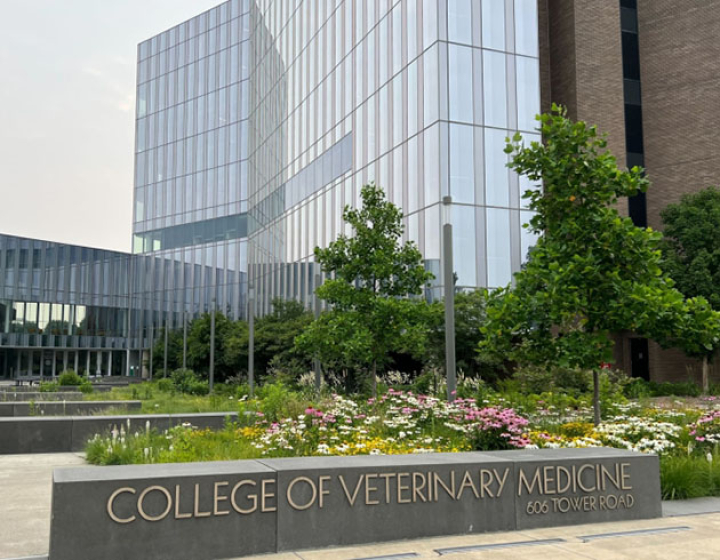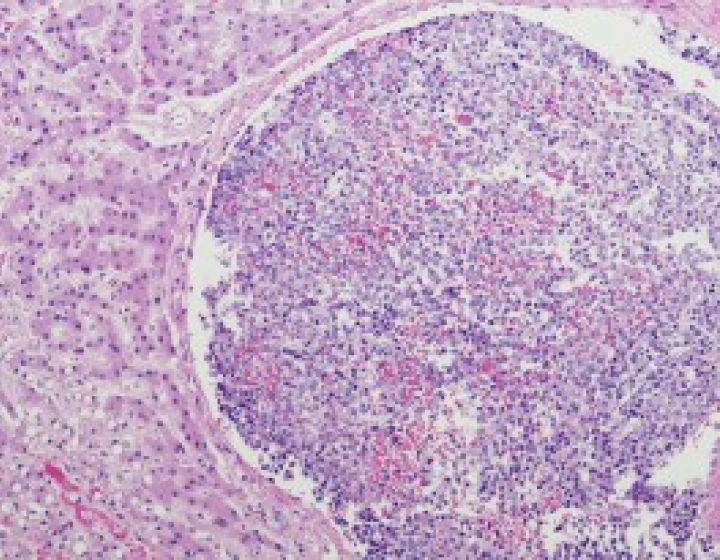Alumni launch new fund to support well-being efforts at the college
As a veterinary student, Bruce Christensen, D.V.M. ’02, didn’t need to think much about his mental health. While Cornell’s curriculum was rigorous and he faced his share of personal struggles during that time, he emerged feeling he had life relatively under control. It was only later in his professional career that difficulties in all areas of his life converged and brought mental health starkly into focus. “I started having panic attacks, and it was unlike anything I had ever experienced,” he says. During this time, another blow struck. One of Christensen’s close friends from veterinary school, Ed Park, D.V.M. ’02, ended his own life. This tragedy came as a shock to Christensen and his fellow classmates. “All of those elements came together and really made me feel like, if there is something we can do about these issues — we should,” Christensen says.
This idea crystallized into the College of Veterinary Medicine (CVM) Well-being and Mental Health Fund, spearheaded by Christensen and fellow classmate Ericka Mendez, D.V.M. ’02. If successfully endowed at the required $100K amount, this fund would offset costs associated with the curricular adjustments already underway and programmatic efforts overseen by the new CVM director of well-being, Kathryn Buckley ’01.
“It is our hope that as students engage with the reality of mental health challenges in our profession and use their time in veterinary school to develop resilience and positive coping strategies, we can reduce individual crises and increase overall personal peace and happiness for those who follow us,” Christensen and Mendez wrote in a letter to their classmates.
Institutional tools
Well-being is already a topic of great importance to the profession. Currently, both the American Association of Veterinary Medical Colleges and the American Veterinary Medical Association have focused resources on addressing mental health struggles for students and professionals. Such resources include a professional quality of life assessment tool, wellness podcasts, monographs, webinars and checklists. CVM has also established well-being as a strategic priority, taking a proactive and preventive approach to identify factors impacting the health and well-being of faculty, students and staff. The college established a well-being director position in 2018, now held by Buckley, who is ready to roll up her sleeves to continue this important work at the college.
“Creating an academic and work environment that effectively encourages well-being takes time and constant attention,” Buckley says. “Individuals need the knowledge and evidence-based supports necessary to monitor and improve personal well-being. Simultaneously, and of equal importance, an institutional culture needs to be facilitated where well-being can be optimized. A lot of groundwork and momentum has already been generated at CVM, and I’m eager to build upon it.”
Learning self-compassion
While the college and profession have taken important steps in facilitating well-being, such resources weren’t readily available when Mendez and Christensen were in veterinary school, and furthermore — they didn’t feel that they needed them.
“I was good in vet school. I can say that with certainty,” says Christensen. Mendez agrees with him. “We didn’t feel like we needed help. If they had offered programs as an elective, I don’t think many of us would have taken them.”
However, the pressures of work and life began to take a toll as their professional lives progressed. For Mendez, her work habits, personal life and the stresses of her veterinary career began piling up. “I developed my own personal problems, and everything became very difficult,” says Mendez. “Learning how to juggle it all was overwhelming.”
Out of necessity, Mendez began learning well-being skills to help her cope with these challenges. This led to Mendez starting her own life coaching business, The Purposeful Vet, in which she helps other veterinarians harness the same skills of boundary-setting and self-care.
Christensen decided to specialize in theriogenology and was thrilled when he joined the faculty at the University of California, Davis, School of Veterinary Medicine (UC Davis).
“I thought UC Davis would be the be-all, end-all for me,” says Christensen. “I thought that was going to be my legacy.”
However, life threw several curve balls at him. He began facing professional challenges as well as personal struggles at home. “Even though I’d been through rough stuff before — this convergence of all parts of my life made this different,” says Christensen.
It was the panic attacks that made Christensen recognize that he needed to do things differently. He ended up leaving academia and starting his own private practice — Kokopelli Assisted Reproductive Services. Since then, Christensen is happier and healthier — and ready to help others. He and Mendez now hope the new fund will help veterinarians better navigate similar personal and professional challenges.
Building foundations
CVM aims to do just that. Well-being skills and mindsets are currently being woven into the curriculum thanks to efforts by college faculty members, among them Dr. Ricardo de Matos, associate clinical professor of competency-based veterinary education curriculum development. De Matos previously worked primarily as a clinician in the exotics service at the Cornell University Hospital for Animals (CUHA), but his own journey with well-being drew him to this new role.
“I had essentially ignored that side of my life,” says de Matos. “So, I got pushed into it the hard way through my own personal challenges.” From there on, de Matos developed skills to support his own mental health and well-being, but a question nagged at him — why did it have to take such hardship to finally arrive at these solutions?
De Matos is trying to help students avoid such pitfalls by starting important conversations about well-being now. “I use the analogy of building a house,” he says. “What we’re doing is building the foundation of their veterinary education. If a student is not well, anything you add on top of that is at risk of crumbling.”
The CVM curriculum committee gathered a group of faculty from different departments and with different personal and professional experiences to think strategically about incorporating well-being skills into the D.V.M. curriculum. Last year saw the initial incorporation of well-being into classes, with the goal that these skills and discussions will become deeply engrained with the rest of the programming.
Additionally, there are existing classes that address well-being head-on. De Matos teaches “The Healer’s Art,” a course originally developed for medical students to help them deal with similar struggles. It provides a supportive setting where students can build connections and community with colleagues. It also invites faculty and local practitioners to share their own experiences.
To have professors and mentors open up about their struggles and errors would have made a huge difference, says Mendez. “In my eyes, my professors were infallible,” she says. “When I was being mentored, no one shared stories of making mistakes — that wasn’t modeled to me.”
Christensen agrees, recalling a particularly traumatic moment in his career in which he accidentally caused a fatal injury to a healthy mare during a routine exam at UC Davis. “Sometimes you make mistakes, and they have small consequences — and sometimes they have huge consequences,” says Christensen. “It happens to all of us. It is a part of the job — but we didn’t learn how to deal with that. Nobody did.” Having colleagues reach out in empathy and commiseration, sharing their own similar experiences, helped Christensen come to terms with his own fallibility and accept it.
Caring for the caretakers
Christensen and Mendez are heartened to know that along with the gift they are spearheading, their alma mater is actively working to ensure students do learn how to deal with the future’s inevitable challenges.
Buckley is ready to push this work forward, both for students and the entire CVM community.
“CVM is made up of stunningly kind, compassionate, resilient, driven, curious people,” says Buckley. “They are givers beyond compare. I’d like to help nurture CVM’s supportive community so that everyone’s natural strengths can be elevated and fortified, and people can flourish in every area of their lives.
With the college thinking deeply and taking meaningful action on the issue, alumni like Christensen and Mendez have taken pride in their alma mater’s leadership. “One thing that remained constant at Cornell is their dedication to staying at the head of where the profession should go,” says Christensen. “Despite being one of the oldest veterinary colleges, they do a good job of not being stuck in the past and the tradition that they’re steeped in. I knew that if there was any place that would grab onto this idea of integrated well-being support, it would be Cornell.”
Fundraising for the CVM Well-being and Mental Health Fund thus far has been strong, with approximately half of the required $100,000 raised so far. As this momentum continues, the college will do its part in ensuring that well-being is a key focus for all members of its community.
For those interested in supporting the fund, they can make a gift by clicking here. Check donations should be sent to: Cornell University, Box 37334, Boone IA 50037-4334, made payable to “Cornell University,” and include a note indicating that the gift should be applied to the CVM Well-being and Mental Health Fund.
Written by Lauren Cahoon Roberts





